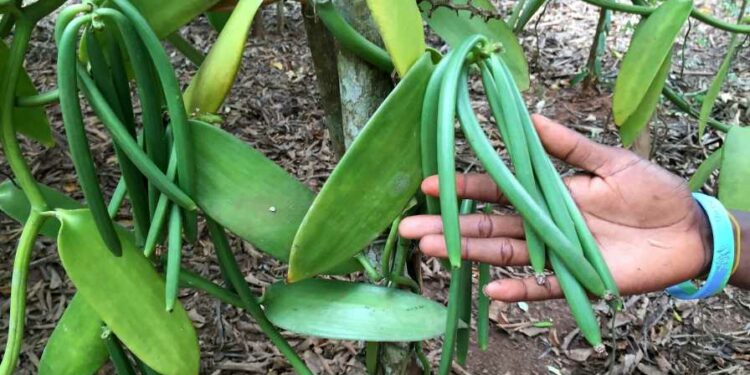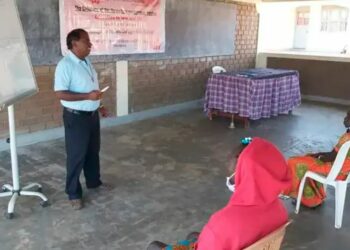The Minister of State for Agriculture Fred Bwino Kyakulaga has revealed that Uganda’s vanilla industry once celebrated for its rapid growth and potential, is now grappling with significant challenges as global market conditions take a toll on farmers.
Vanilla, dubbed “green gold,” is the world’s second most valuable spice after saffron, with Uganda ranking as the second-largest producer globally. Despite its remarkable progress, including a 78% growth in export volumes between 2019 and 2023, the sector is under strain due to steep price declines and market oversupply.
Speaking at the Uganda Media Centre on Tuesday, Minister Kyakulaga, noted that Uganda’s vanilla export volumes had increased from 4.1 metric tons in 2019 to 266.7 metric tons in 2023, earning $20.66 million. “This impressive performance reflects increased production and the efforts of smallholder farmers embracing the economic potential of vanilla cultivation,” he said. However, he acknowledged that the steep price decline in 2023-2024 had caused widespread frustration among farmers.
“Many farmers are considering abandoning the crop for more lucrative options like coffee and cocoa, whose prices have doubled,” Hon. Kyakulaga revealed. Despite this, he encouraged farmers to diversify their agricultural practices rather than abandon vanilla altogether, citing its potential for profitability even in challenging times.
Currently, Uganda’s vanilla is sold at an average market price of UGX 8,000 per kilogram of green beans. Under ideal conditions, a farmer can still earn an annual net income of UGX 25.16 million per acre, according to the Ministry of Agriculture. However, many farmers remain uncertain about their future in the sector.
The government has implemented strategic measures to support the industry. These include district ordinances to improve governance, registration, and licensing of vanilla actors, and the development of a digital traceability system to enhance transparency.
Additionally, the Ministry has collaborated with Makerere University to adopt a scientific approach to determining vanilla maturity. “The declaration of vanilla harvest dates, introduced in 2019, has tremendously improved the quality of Ugandan vanilla on the international market,” Kyakulaga said.
Despite these efforts, the Minister emphasized the importance of maintaining quality and adhering to global market requirements. “Growers should harvest only fully mature and ripe vanilla beans, adhering to the approach of selective harvesting,” he urged, adding that the government would take punitive action against anyone found violating the stipulated harvest guidelines.
The declared harvest period for Season B 2024 will run from December 27, 2024, to March 27, 2025. As Uganda navigates the complexities of the international vanilla trade, Minister Kyakulaga called for unity among stakeholders. “It is critical for all stakeholders in the vanilla value chain to address the challenges and build a vibrant, resilient, and sustainable vanilla industry. Together, we can position Uganda as a leading producer of high-quality vanilla in the global market,” he concluded.
For many farmers, the hope for a market recovery in the next 12 to 18 months offers a glimmer of optimism. The minister promised that while the road ahead is uncertain, Uganda’s vanilla industry holds the potential to thrive again if the right measures are sustained.
Do you have a story in your community or an opinion to share with us: Email us at editorial@watchdoguganda.com














